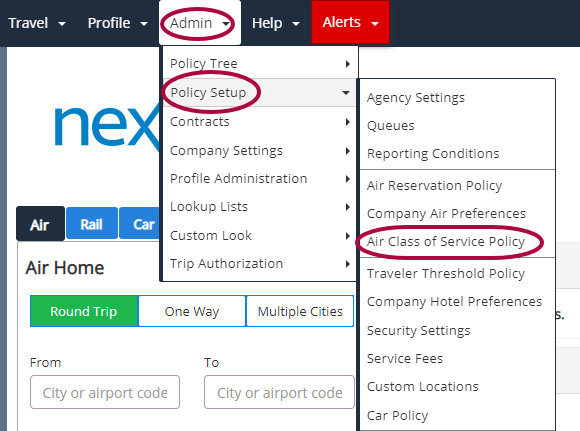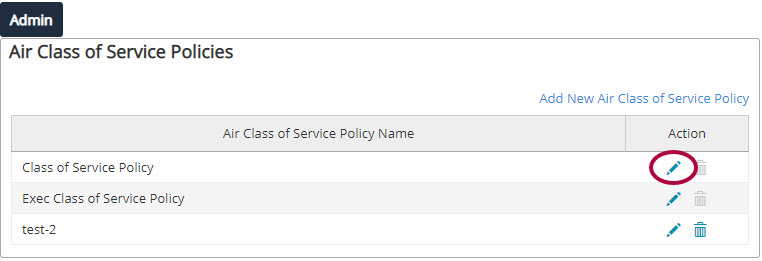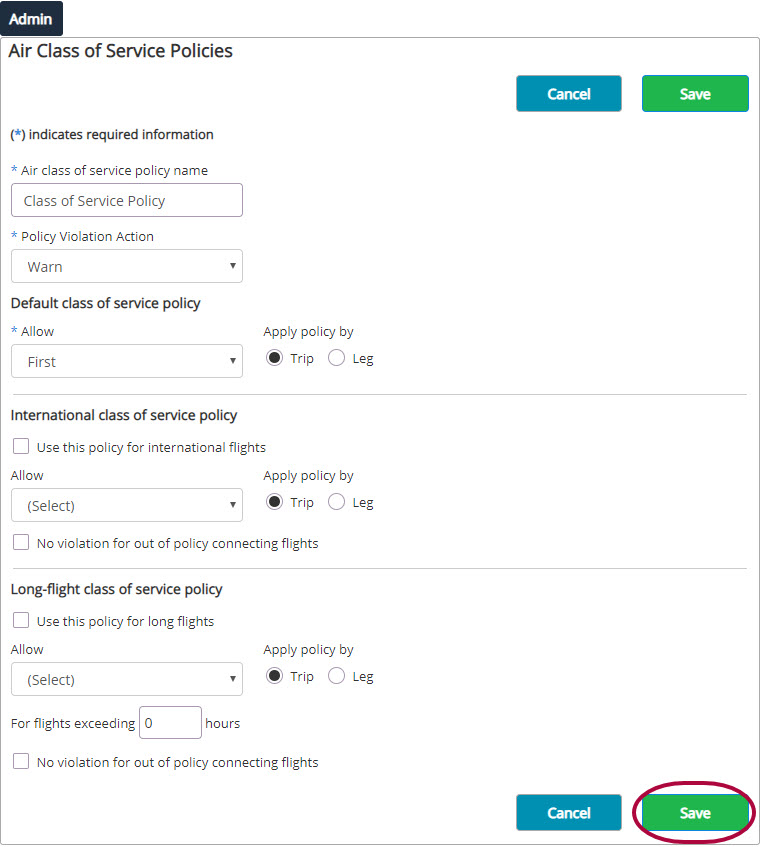Class of Service policies are used to define service restrictions for travelers (such as Economy or First Class). Within each policy, sub-policies can be set for international and long flights.
This document shows you, a TMC Administrator, how to update the Air Class of Service Policy.
Step 1: Select Policy Setup in the Admin menu. Then, Air Class of Service Policy.

Step 2: The Air Class of Service Policies list appears. Select the pencil icon to edit the policy requiring the update.

Step 3: On the Air Class of Service Policies page, use the fields to make required changes.
Air Class of Service Policies
- Air class of service policy name: The name of the policy. This name should be easy to reference. For example, COMPANY Core Permissions.
- Policy Violation Action: Choose whether users are warned or have a policy stop:
- Warn – When booking trips that violate travel policy, the user receives a warning, but can still make a reservation.
- Do Not Allow Reservation – The user is not allowed to make reservations for trips that are out of policy. Instead, they must go back and try again.

Default class of service policy
Choose the default class of service for all flights booked under this policy. These selections are cumulative.
For example, if you choose First, travelers in this policy can book Coach/Economy, Premium Economy, Business, and First-class tickets. Whereas, if you choose Coach/Economy for this policy, the traveler can only book Coach/Economy tickets before they are warned or stopped.
- Allow: Choose the default class: Coach/Economy, Premium Economy, Business, or First.
- Apply policy by: Choose either Trip or Leg:
- Trip – Select this radio button if the default class of service policy applies to the whole trip. If one leg violates the policy, they are not warned or prevented from continuing.
- Leg – Select this radio button if the default class of service policy applies to individual segments/flights of the trip. If any segment/flight of the trip is out of policy, the warning or prevention is triggered
International Class of Service Policy
- Use this policy for international flights: Checkmark this box if the fields in this section apply to international travel only.
- Allow: Select the default class of service for international flights: Coach/Economy, Premium Economy, Business, or First.
- Apply policy by: Choose either Trip and Leg:
- Trip – Select this radio button if the default class of service policy applies to the whole trip. If one leg violates the policy, they are not warned or prevented from continuing.
- Leg – Select this radio button if the default class of service policy applies to individual segments/flights of the trip. If any segment/flight of the trip is out of policy, the warning or prevention is triggered.
- No violation for out of policy connecting flights: A check indicates that connecting flights with a different class of service will not violate the international policy.
Long-flight class of service policy
- Use this policy for long flights: Mark the checkbox if the fields in this section apply to exceptions for long flights, only. The long-flight policy only applies to domestic travel.
- Allow: The default class of service for long flights: Coach/Economy,Premium Economy, Business, or First.
- Apply policy by: Choose either Trip or Leg:
- Trip – Select this radio button if the default class of service policy applies to the whole trip. If one leg violates the policy, they are not warned or prevented from continuing.
- Leg – Select this radio button if the default class of service policy applies to individual segments/flights of the trip. If any segment/flight of the trip is out of policy, the warning or prevention is triggered.
- For flights exceeding __ hours: Enter the number of hours to define a long flight
- No violation of out of policy connecting flights: Mark the checkbox if connecting flights with different classes of service do not violate the long-flight policy
- Step 4: Click Save to apply the changes and return to the Air Class of Service Policies page.

Comments
0 comments
Article is closed for comments.